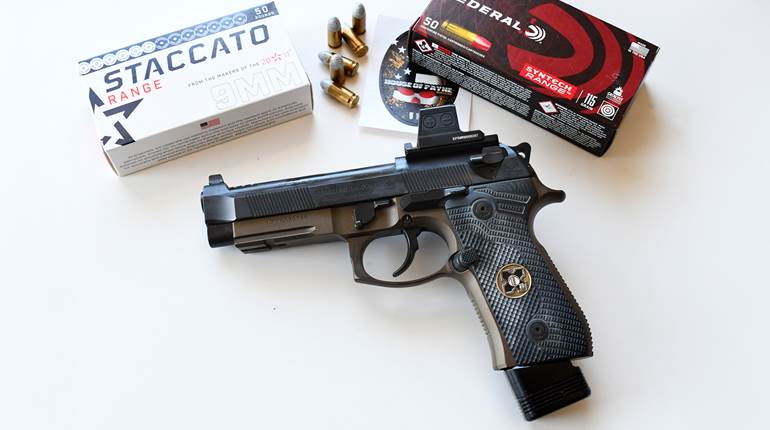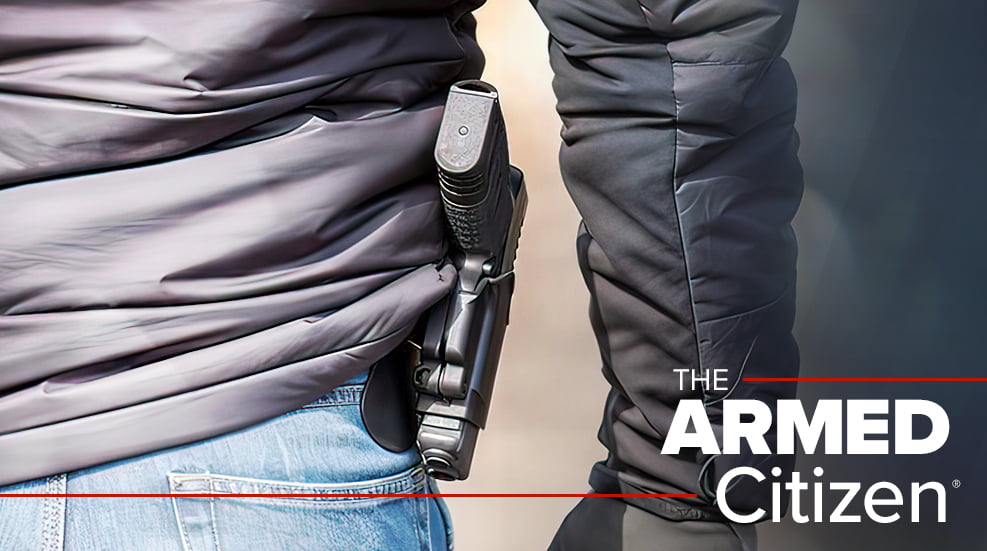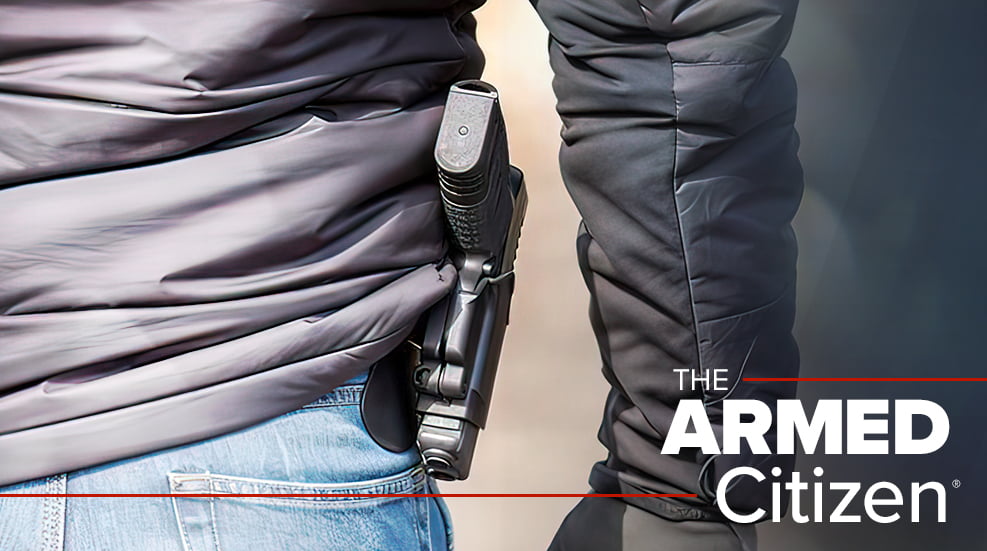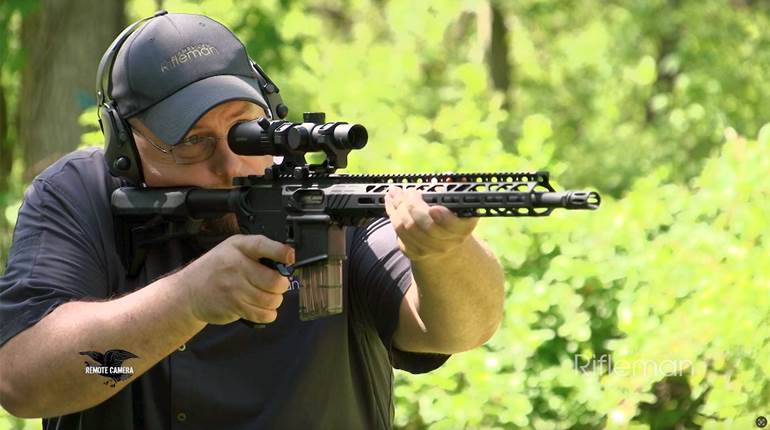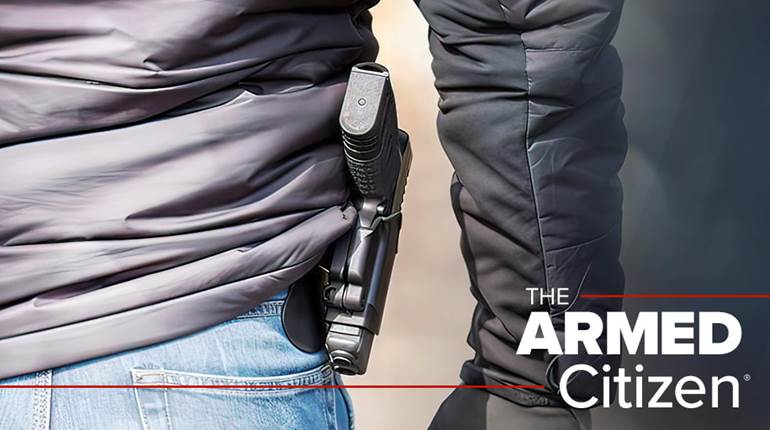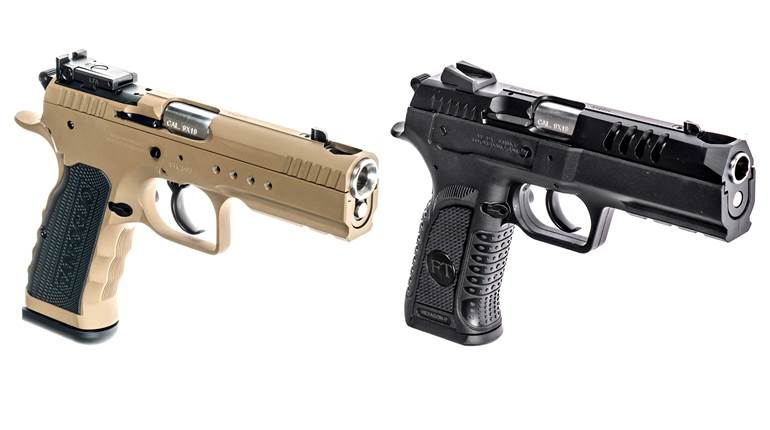
In its Storm series, Beretta offers both a .45 ACP polymer-frame pistol—the Px4—as well as the innovative Cx4 carbine. These guns deliver the sleek lines and ergonomics for which the Italian company has become known, with the stout punch of the .45 ACP.
One thing seems to be certain: a line of pistols is just somehow incomplete without a model in .45 ACP. The Beretta PX4 is anything but a traditionally styled semi-automatic, but it completes the Storm lineup very nicely. And when you match the Px4 pistol with the existing Cx4 carbine, both chambered in the venerable .45 ACP cartridge, you have a winning combination.
Beretta’s idea was to offer both pistols and carbines in 9 mm Luger, .357 SIG., .40 S&W and .45 ACP, although current Beretta literature does not mention guns in the less popular .357 SIG. The most noticeable feature of the Storm .45 pistol and carbine is the modernistic styling. Beretta led the way when it came to guns with futuristic lines, planes and angles.
Cx4 Storm .45 ACP Carbine
While there have been several attempts to market a pistol-caliber carbine in recent years, none of them came with the unique blend of features that distinguish the Beretta entry first offered in 9 mm Luger.
Consider trying to fire a conventional carbine with one hand—you can’t readily do it because the recoiling parts are forward of the small of the stock and the balance of the gun is way off. The Storm has the recoiling bolt and feed mechanism centered around the position of the shooting hand. Indeed, the magazine well is in the pistol grip and all of the controls—trigger, safety, magazine catch and bolt release—are easily reached with the shooting hand. The distribution of weight is such that it’s almost as easy to shoot with one hand as with two—a worthwhile feature. Further, the gun’s controls and functions may be set to suit the right- or left-handed user.
The Cx4 is a 5¾-pound, 29.7-inch-long, blowback-operated carbine that feeds from an eight-round staggered-column magazine. Virtually all exterior surfaces are polymer. Inside is a steel chassis that supports a heavy recoiling bolt. That is necessary because it uses a modern form of blowback operation. It shoots cartridges of relatively mild pressure levels, so a blowback system is sufficient to contain breech pressures. The stock is unique, with a modernistic thumbhole design that wraps completely around the steel inner structure of the gun.
It’s the curves and recesses of the stock that are so different. There’s a mid-length fore-end and a buttplate that adjusts for length of pull by means of spacers. Also at the butt end of the stock, there are integral sling swivels on both the right and left sides. Beretta is well-aware of the widespread use of tactical accessories and includes several mounting points for attaching them. On each side of the stock adjacent to the front sight housing, you’ll find pre-drilled hard mounting points for a Picatinny rail attachment kit for bottom and side-mounted accessories. There is another one on the top centerline of the stock, between the front and rear sights and two would have to be drilled and tapped toward the rear. Those sights are fully adjustable and are housed in gracefully contoured towers. This is a neat-looking, if somewhat unconventional, gun.
Px4 Storm .45 ACP Pistol
Polymer enables designers to put all manner of exotic contours into a firearm. In the Px4 .45, the receiver is a dull black polymer molded around steel rail inserts. The designers obviously took a great deal of time working out the ergonomics of the pistol’s shape—there are swooping, yet functional, curves in the butt and trigger guard. The backstrap, for example, has a non-traditional look, but it is nonetheless attractive and fits the hand well. On the off-chance that the well-shaped butt doesn’t suit the shooter, there are two spares of different sizes—larger and smaller—that tailor the gun to individual preference. Each of these three units has a sort of fish-scale pattern of texturing to enhance purchase. There’s a similar pattern on the frontstrap. At the upper front of the trigger guard, there are recesses that house the twin dismount catches that make the Px4 extremely fast to take down. On the underside of the dust cover there’s an accessory rail.
Beretta engineers came up with a handsome slide design bearing the company’s ultra-tough Bruniton finish that complements the receiver well. Sides of the slide are flat, as is the top, but the transitioning surfaces on the upper corners get a pronounced taper for both cosmetic and functional reasons. The taper increases as it approaches the muzzle, which gives the pistol a racy look. A functional wedge shape makes the gun easier to re-holster quickly when required in tactical circumstances. The Px4 is a handsome, if arguably large, modern semi-automatic pistol.
The gun employs all required characteristics and a few of the more sensible options. You can have either a traditional double-action/single-action or double-action-only. The sample came with the double-action/single-action, which features a decocker/safety lever on the slide. The lever is repeated on the right side of the slide.
It is a recoil-operated gun and departs from the typical tilting barrel lock-up by using a rotary barrel action. The recoiling parts are initially locked together for a short distance, after which the barrel encounters an angled cam, which rotates it a few degrees and unlocks it from the slide. While the barrel stops, the slide continues rearward to allow extraction and ejection. A powerful coil spring under the barrel compresses during rearward movement then extends to drive the recoiling parts forward. Usually, one of the by-products of a rotary barrel is a rather thick pistol, but the Px4 seems to be only marginally larger than competing models. With a semi-staggered column magazine of nine rounds that falls free when released, and fixed three-dot sights, the Beretta Px4 competes favorably with pistols from virtually all the makers. By any standard, it is a functional pistol that is also stylishly handsome.
On The Range
Shooting the guns revealed their unique characteristics. I fired them not only to produce the data printed with this story, but also to develop impressions of how they might function in tactical situations. While it is a pretty chunky gun, the Px4 pistol is not so large that it cannot be managed with practice. It has one unusual feature in that it tends to twist (or torque) slightly when fired. This is likely a function of the rotary barrel locking system. A strong Weaver stance helps greatly in shooting the pistol, which seems to be accurate and dependable. I encountered no malfunctions while firing several hundred rounds, and accuracy was adequate.
The Cx4 carbine was slightly more accurate. Part of that may be due to a longer sight radius and the fact that I was shooting through a familiar peep-and-post sight system. I was surprised to get some rather snappy recoil from the Cx4, but that may be a function of a blowback operating system. Although the gun has about a foot more of barrel length than the Px4, velocities increased by around 200 fps. Several kinds of ammunition cycled through the arm without issue. That’s a virtue of course, but the gun’s greater virtue may be the way that it can be set up for individual preference. I set up this one with the cocking handle on the right side, ejection to the left, magazine catch on the right and manual safety on the right side. I put the ejection port away from my face. Because of its balance around the shooting hand, it is easy to work one-handed. My only serious criticism is the non-compatibility of the Cx4 and Px4 magazines.
Fitted with a suitable extended magazine of 14 or 15 rounds, the Cx4 would be a formidable home defense arm, accurate to possibly 50 or 75 yards and intimidating at closer ranges. There are plenty of hard points to add rails for lights, lasers and the entire panoply of devices that delight today’s tactical shooters. Both of these Beretta firearms are reliable guns with unique features.
Specs:
Importer: Beretta USA; (301) 283-2191; www.berettausa.com
Caliber: .45 ACP
Action Type: (Px4) recoil-operated semi-auto; (Cx4) blowback-operated semi-auto
Frame: (Px4) polymer; (Cx4) steel chassis, molded polymer stock
Barrel: (Px4) 4”; (Cx4) 16.6”
Rifling: six-groove, 1:15.9” RH twist
Magazine Capacity: (Px4) nine; (Cx4) eight
Sights: (Px4) drift adjustable three-dot; (Cx4) aperture rear, post front adjustable for windage and elevation
Trigger Pull: (Px4) single-action 4 lbs., double-action 12 lbs.; (Cx4) single-stage 4 lbs.
Overall Length: (Px4) 7.6”; (Cx4) 29.7”
Width: (Px4) 1.4”; (Cx4) 2.5”
Height: (Px4) 5.5”; (Cx4) 7.5”
Weight: (Px4) 28.2 ozs.; (Cx4) 5 lbs., 12 ozs.
Accessories: (Px4) lock, hard case, manual, two spare backstraps; (Cx4) hard case, manual, short rail section, spare magazine
Suggested Retail Price: (Px4) $1,035; (Cx4) $915












